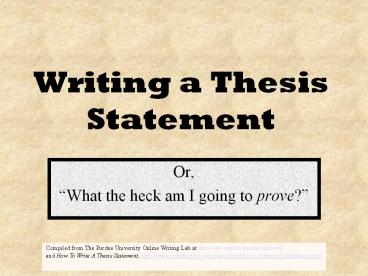Writing a Thesis Statement - PowerPoint PPT Presentation
Title:
Writing a Thesis Statement
Description:
Title: Creating Research Paper Note Cards Author: Norman E. Forney III Last modified by: lpcsd Created Date: 11/8/2006 1:21:26 AM Document presentation format – PowerPoint PPT presentation
Number of Views:116
Avg rating:3.0/5.0
Title: Writing a Thesis Statement
1
Writing a Thesis Statement
- Or,
- What the heck am I going to prove?
Compiled from The Purdue University Online
Writing Lab at http//owl.english.purdue.edu/owl/
and How To Write A Thesis Statement,
http//www.indiana.edu/wts/pamphlets/thesis_state
ment.shtmlassigned
2
What is a Thesis Statement?
- A thesis statement is a sentence (or sentences)
that expresses the main ideas of your paper and
answers the question or questions posed by your
paper. - It offers your readers a quick and easy to follow
summary of what the paper is about, and a guide
on how you will reveal this.
3
Why Should Your Essay Contain a Thesis Statement?
- To test your ideas by distilling them into a
sentence or two - To better organize and develop your argument
- To provide your reader with a guide to your
argument
Your thesis statement will accomplish these goals
if you think of the thesis as the answer to the
question your paper explores!
4
General Tips
- Narrow it down - If your thesis statement is too
broad you wont be able to prove it in 3-4 pages. - Make it interesting - Does it pass the So What?
test? Is it something the reader will want to
know about? - Two parts - A thesis statement generally consists
of two parts your topic, and then the analysis,
explanation, or assertion that you're making
about the topic.
5
For example
- Many minority groups suffered greatly under the
Nazi regime during World War II. Jews, Gypsies,
and even Catholic priests were subjected to
horrible atrocities during this time period.
(This is a broad, general statement)
6
For example
- With the exception of Eastern European Jews, no
group suffered more indignant persecution than
homosexuals, (this introduces a topic and makes
an assertion) who were tortured, stripped of all
their worldly possessions, and dehumanized in an
orderly, state sponsored campaign. (this lists
how I will prove my assertion or argument)
7
For example
- This thesis statement
- Introduces my topic (persecution of homosexuals)
- Makes an assertion (no group suffered more
indignant persecution) - Lists how I will inform the reader or prove my
argument ( were tortured, stripped of all their
worldly possessions, and dehumanized in an
orderly, state sponsored campaign.).
8
General Tips
- A thesis statement is a very specific statement
-- it should cover only what you want to discuss
in your paper, and be supported with specific
evidence.
9
General Tips
- Generally, a thesis statement appears at the end
of the first paragraph of an essay, so that
readers will have a clear idea of what to expect
as they read.
10
General Tips
- You can think of your thesis as a map or a guide
both for yourself and your audience, so it might
be helpful to draw a chart or picture of your
ideas and how they're connected to help you get
started.
11
General Tips
- As you write and revise your paper, it's okay to
change your thesis statement -- sometimes you
don't discover what you really want to say about
a topic until you've started (or finished)
writing! Just make sure that your "final" thesis
statement accurately shows what will happen in
your paper.
12
Strategies for writing a thesis
- Ask yourself So what? or Who cares?
- Review your topic and ask, What do I find
interesting about this? This is the basis for
your thesis statement (Homosexuals persecuted by
the Nazis). - Once youve established a basis or focus, its
time to ask a question about your topic (How
were homosexuals persecuted? or Were
homosexuals persecuted to a greater extent than
other groups?). - The answer to this question (or questions)
becomes your thesis!
13
Questions to ask yourself
- What am I trying to prove?
- What is my claim or assertion?
- What are the reasons I have to support my claim
or assertion? - In what order should I present my reasons?
14
The End or is it?
Be sure to tune in next week to Note cards from
the Edge































